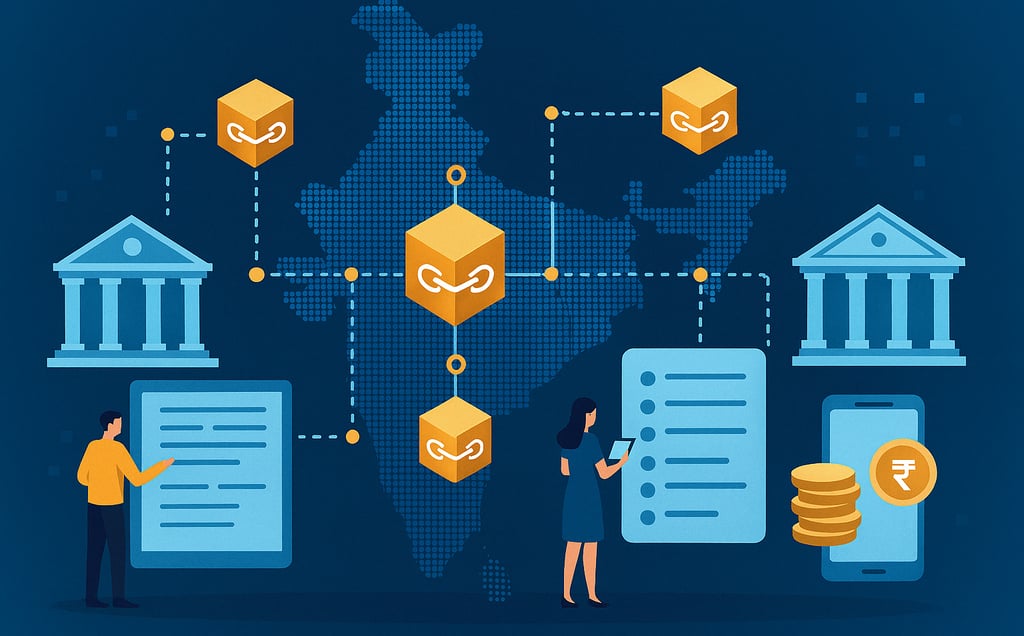Blockchain in Indian Finance: Revolutionizing Transactions and Transparency in 2025
4/15/20252 min read


Blockchain in Indian Finance: Revolutionizing Transactions and Transparency in 2025
The Indian financial sector is undergoing a massive transformation (Blockchain in Indian finance), and blockchain technology now leads this evolution. In 2025, financial institutions across India are actively leveraging blockchain to improve transaction speed, enhance security, and deliver unmatched transparency. Clearly, blockchain has moved beyond theory—it is now driving real-world innovation.
What is Blockchain and Why It Matters
To begin with, blockchain is a digital ledger that stores transaction records across a decentralized network. Unlike traditional systems that rely on centralized control, blockchain enables direct, peer-to-peer verification. As a result, financial institutions in India are embracing it to reduce costs, prevent fraud, and increase data reliability.
Banking and Digital Transactions
In the banking sector, blockchain is streamlining processes significantly. For instance, Indian banks are now using it to fast-track Know Your Customer (KYC) verifications. Moreover, decentralized storage prevents data duplication and improves accuracy. Additionally, smart contracts are reducing interbank settlement time and improving workflow efficiency.
Cross-Border Payments
When it comes to international remittances, blockchain offers a game-changing solution. Indian banks and payment platforms are turning to networks like Ripple and Stellar for faster, more secure transfers. As a result, transaction times have dropped from days to minutes. Not only do users benefit from speed, but they also enjoy reduced fees and greater trust.
Capital Markets and Stock Exchanges
Stock trading in India is also witnessing a blockchain revolution. Exchanges and brokers now record transactions on immutable ledgers. Consequently, investors gain access to real-time trade histories and improved accuracy. Furthermore, the Securities and Exchange Board of India (SEBI) supports this transformation to enhance market transparency and accountability.
Regulatory Technology (RegTech)
In addition to trading and banking, blockchain is transforming regulatory compliance. Indian companies are deploying blockchain-powered RegTech solutions to monitor risks and flag anomalies instantly. This not only enhances oversight but also reduces the burden of manual audits. Hence, companies stay compliant with less effort and greater accuracy.
Challenges and Roadblocks
Nevertheless, challenges still exist. Some firms hesitate due to high setup costs or the lack of skilled personnel. Others remain cautious because regulatory frameworks are still evolving. However, strong government backing and growing pilot programs continue to pave the way for broader adoption.
Future Outlook
Looking ahead, blockchain is expected to play a central role in India’s financial evolution. Its integration with artificial intelligence, UPI, and digital currencies could create a more intelligent and resilient financial ecosystem. Thus, early adopters stand to gain a significant competitive advantage.
Conclusion:
To sum up, blockchain is no longer optional in the financial world—it is foundational. Indian institutions that embrace blockchain in 2025 (Blockchain in Indian finance) are not only keeping up with the times but are also preparing to lead in the future. With benefits spanning security, speed, and compliance, blockchain is set to define the next chapter of Indian finance.
About One Solution
Quick Links
Contact Info
One Solution — Your trusted partner for financial success.
📍 F17, Grand Plaza, Paltan Bazar
Guwahati, Kamrup (M), Assam
India, Pin: 781008
📞 9650072280
© 2025 One Solution. All Rights Reserved.
